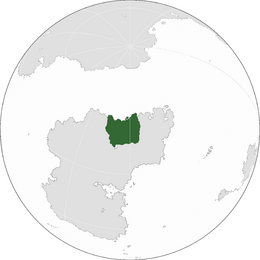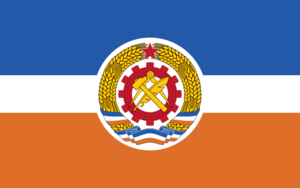Pätschlàn
This article is incomplete because it is pending further input from participants, or it is a work-in-progress by one author. Please comment on this article's talk page to share your input, comments and questions. Note: To contribute to this article, you may need to seek help from the author(s) of this page. |
People's Republic of Pätschlàn Republică Popular da Pätschlàn | |
|---|---|
|
Flag | |
| Motto: Viensità in Pariensità es Traval ("Unity in Equality and Labor") | |
 | |
| Capital | Frédéricville |
| Official languages | Pätschlàni |
| Demonym(s) | Pätschlàni |
| Government | Federal one-party socialist republic |
• Chairman of the Directorate | Tric'hard Davinescu |
| Legislature | Assembly of the Republic |
| Congress of the Provinces | |
| People's Chamber | |
| Communist Revolution | |
| 1932 | |
| Area | |
• Total | 1,937,271 km2 (747,985 sq mi) |
| Population | |
• 2019 census | 155,175,407 |
• Density | 80.1/km2 (207.5/sq mi) |
| GDP (PPP) | 2021 estimate |
• Total | $833.048 billion |
• Per capita | $28,224 |
| Currency | Pätschlàni Orescă (Ø) |
| Date format | DD/MM/YYYY |
| Driving side | right |
| Calling code | +18 |
| Internet TLD | .pt |
Pätschlàn (officially the People's Republic of Pätschlàn) is a nation in eastern Stratea, bordered by the Gagium to the east, and the León Monarchy to the south. The capital, Oshkosh is located in the northwestern part of the country, along the shore of Lake Winnebago. The nation's largest city is Rochester, located in the smallest of the three regions, the westerly-located County of Monroe. Other major cities include Charlottesville, Green Bay, Appleton, and Scottsville. Formed in the early 19th century from what had been a personal union of three separate polities, Fluvannia is as a result a large and geographically diverse nation, inhabited by approximately 213.84 million people as of the 2020 census. A federal constitutional monarchy, Fluvannia is comprised of two duchies and a county, each of which possess a high degree of autonomy. Unlike the case of many constitutional monarchies, the Fluvannian monarch, titled the Crown Prince, plays an active but nonpartisan role as the head of the nation's executive branch. Popular democracy is exercised by the legislature's lower house, the House of Delegates. Over 8.9 million people live in the Greater Rochester area, the largest in the country, which has functioned as a hub for trade since medieval times.
